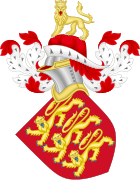Circumspecte Agatis
This article needs additional citations for verification. (May 2024) |
| Act of Parliament | |
 | |
| Long title | Statutū Circumspecte Agatis |
|---|---|
| Citation | 13 Edw. 1. |
The statute of Circumspecte agatis (Latin: Statutū Circumspecte Agatis), or Circumspecte Agatis, was an English statute issued in 1285 by King Edward I. It defines the jurisdictions of Church and State, forcing church courts to confine themselves to ecclesiastical cases. This, along with the Articuli Cleri of Edward II, the Act of the 18th of Edward III (1344) and the Charter of Edward IV (1462), eventually settled this long-standing dispute.
The original statute issued by Edward I was a response to a dispute involving the bishop of Norwich.[1] The instructions to the king's judges were to:
...use yourselves circumspectly in all matters concerning the Bishop of Norwich and his Clergy, not punishing them if they hold Plea in Court Christian, of such things as be meer spiritual, that is to wit, of Penance, enjoined by Prelates for deadly Sin, as Fornication, Adultery, and such like.[1]
See also[edit]
References[edit]
- ^ a b Wingard, Tim (November 2022). "trial of Thomas Frogbrook: bestiality and the law in an early sixteenth-century English rural community". Historical Research. Vol. 95, no. 270. pp. 506–521. doi:10.1093/hisres/htac011. Retrieved 29 May 2024 – via EBSCOHost.
